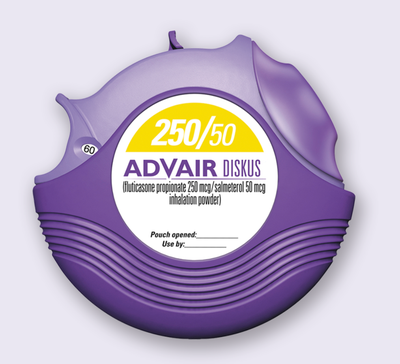People’s Pharmacy: Is there milk sugar (lactose) in your inhaler?

Q. I have chronic obstructive pulmonary disease and used Advair Diskus for years, getting sicker and sicker. I finally took the matter into my own hands. My online research uncovered the fact that Advair Diskus (and many other dry powder breathing meds) contains lactose. I am allergic to lactose! My doctor didn’t know about this and was shocked.
A. People who are sensitive to milk protein or milk sugar (lactose) should be informed that dry powder inhalers for chronic obstructive pulmonary disease or asthma may contain lactose as a filler. The maker of Advair Diskus states that its formulation contains lactose, “which contains milk proteins.” Thank you for alerting us to this potential problem. Advair HFA does not contain lactose and might offer an alternative.
Q. I read that taking drugs like simvastatin can reduce my levels of CoQ10. What is that? Do I need it? Can I supplement it with something in my diet?
A. Your body makes Coenzyme Q10, or CoQ10. In particular, this natural substance is essential for the proper functioning of mitochondria, the power factories of every cell in the body.
Statins interfere with the production of CoQ10. This has led many doctors to speculate that depletion of this compound might be responsible for statin-associated myalgia. It is characterized by muscle pain, weakness and cramps. Sadly, though, studies have not demonstrated that supplements of CoQ10 can counteract this complication of statins (American Journal of Health System Pharmacy, June 1, 2017).
CoQ10 does appear safe, except for people taking the anticoagulant warfarin. This supplement has been shown to be helpful for people with heart failure (Cardiology Journal, March 5, 2019).
CoQ10 is available in the diet. The foods that supply the most are meat, fish and poultry, but oils from soybeans, corn and olives also provide it, as do seeds and nuts.
Q. I have been on levothyroxine (75 mcg) for many years to treat a hypothyroid condition. I still feel exhausted every day. My skin is incredibly dry, I am losing far too much hair and gain weight even though I am on a strict diet. I can never get warm enough even with extra layers.
My thyroid panel is within the normal range, so my doctor says I am fine and won’t change my prescription. I have asked him about switching me to natural thyroid (Armour) or adding T3 in the form of Cytomel. He seems to believe my symptoms are psychological. How can I convince him otherwise?
A. You are not the only person with hypothyroidism who is not thriving on levothyroxine (T4) treatment alone. Researchers have found that as many as 10% to 15% of people on this medication still have some symptoms of inadequate thyroid hormone (Annals of Internal Medicine, Jan. 5, 2016). This may be due to genes that make the body less efficient in converting T4 to the active form of the hormone, T3.
Leading researchers suggest that some of these individuals will feel better on combination therapy (Frontiers in Endocrinology, July 9, 2019). They urge endocrinologists to personalize thyroid treatment so that patients end up feeling well.
You can learn more about this approach in our eGuide to Thyroid Hormones. This online resource may be found under the Health eGuides tab at peoplespharmacy.com.
If your doctor reads about the research, he may be willing to consider adjusting your prescription.
In their column, Joe and Teresa Graedon answer letters from readers. Write to them in care of King Features, 628 Virginia Drive, Orlando, FL 32803, or email them via their website peoplespharmacy.com.